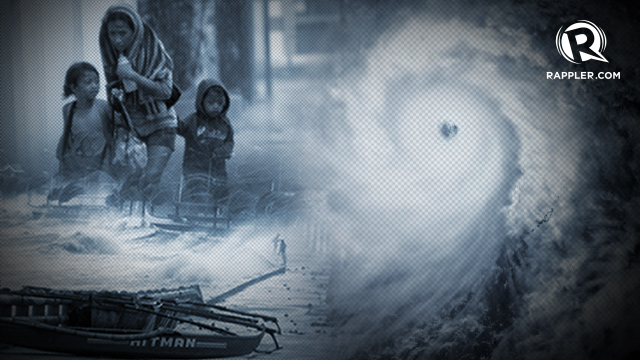SUMMARY
This is AI generated summarization, which may have errors. For context, always refer to the full article.

PARIS, France – Meteorologists have yet to formally link global warming to typhoons like the one that devastated the Philippines, but they expect increasingly extreme weather phenomena due to a rise in ocean temperatures.
The trail of death and destruction left in the wake of Super Typhoon Haiyan was at the forefront of a new round of United Nations climate talks that opened Monday in Poland, as Philippine authorities warned some 10,000 people may have died.
Haiyan – the most powerful typhoon to make landfall ever recorded – swept over the Philippines Friday, just days before the 12-day UN climate talks opened in Warsaw to a slew of warnings about potentially disastrous warming with increasingly extreme weather phenomena.
“There is a tendency of [oceans] warming up and an increase in the intensity of cyclones is part of the risks,” said Herve Le Treut, a Paris university professor and climatologist.
Typhoons, hurricanes, and cyclones are different names given to the same powerful weather phenomenon according to the region it hits, but meteorologists use the generic term “cyclone” when talking generally about these super storms.
In September, the Intergovernmental Panel on Climate Change (IPCC), mandated by the United Nations to make scientific assessments about the risks of climate change, concluded in a report that it was “virtually certain that the upper ocean…warmed from 1971 to 2010.”
It is estimated that temperatures rose by around 0.1 degrees Celsius per decade down to a depth of 75 meters (246 feet), and even warmed a little further down.
Meteorologists believe that the upper ocean also got warmer during the first half of the 20th century, but whether the rise in ocean temperatures is caused by man or by natural changes on the planet is still being debated.
Fabrice Chauvin, a researcher at France’s National Centre for Meteorological Research, pointed out that there were no satellites to track cyclones before the 1970s, which has hindered in-depth research on the phenomenon.
The IPCC however said in 2007 that based on climate models, it was “probable” that cyclones would become more intense and generate more rain than before.
Drawing energy from the seas
Cyclones are formed from simple thunderstorms at certain times of the year when the sea temperature is more than 26 degrees Celsius (79 Fahrenheit) down to a depth of 60 metres, and draw their energy from the heat.
Chauvin said that higher temperatures at the surface of oceans would create a bigger source of heat energy for cyclones.
“There will therefore be a tendency to have slightly more violent cyclones,” he said, while pointing out that computer-generated climate models nevertheless predict fewer such super storms in the future.
Steven Testelin, a forecaster at national weather service Meteo-France, added that the warming of oceans was “far from uniform.”
“Some seas warm up quicker than others, which can lead to more intense cyclones in some areas,” he said.
The UN climate talks in Warsaw aim to work toward a deal to cut Earth-warming greenhouse gas emissions, due to be signed in 2015 in Paris, and Haiyan was at the forefront of Monday’s opening session.
In an emotional appeal to delegates, Philippine climate negotiator Naderev Sano pledged to fast at the talks until concrete progress is made toward fighting the climate change he blames for the typhoon that battered his own home village.
“What my country is going through as a result of this extreme climate event is madness. The climate crisis is madness. We can stop this madness right here in Warsaw,” he said.
“I speak for the countless people who will no longer be able to speak for themselves.” – Rappler.com
Add a comment
How does this make you feel?
There are no comments yet. Add your comment to start the conversation.